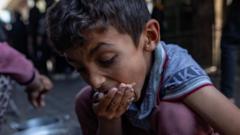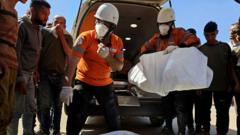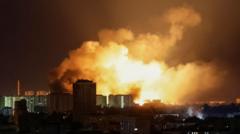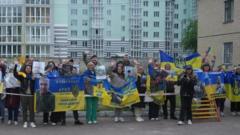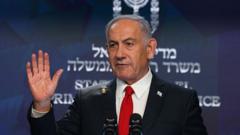Following a brief period of peace, Israeli airstrikes have resumed in Gaza, resulting in catastrophic casualties as the community grapples with grief during Ramadan. Eyewitness accounts describe harrowing scenes as the violence returns without warning.**
Unforeseen Terror: Renewed Conflict in Gaza Shatters Ramadan Peace**
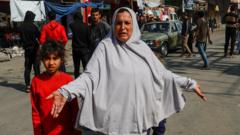
Unforeseen Terror: Renewed Conflict in Gaza Shatters Ramadan Peace**
A sudden escalation in violence amidst Ramadan has left over 400 dead and countless others wounded, reviving fears and anguish among Gaza's residents.**
Mourners in Gaza are grappling with immense sorrow after a night marked by sudden Israeli airstrikes that resulted in over 400 deaths, predominantly affecting women and children. The violence resumed abruptly during the holy month of Ramadan, shattering a fragile calm that had lasted for 50 nights. Residents had just begun their pre-dawn Suhoor meals when the deafening sounds of explosions and gunfire tore through the night.
Essam Abu Odeh recalled the terror that unfolded when Israeli warplanes targeted their neighborhood in Gaza. "My daughter woke me up, warning me about the bombs," he told BBC reporters. As fear swept through the streets, over 600 others were injured, prompting doctors in local hospitals to struggle against an overwhelming influx of casualties.
While Israel claims it targeted Hamas leadership, the local health authorities report a devastating toll on civilians. Ahmad Mo'in al-Jumla, a resident caught in the strikes, survived only after being pulled from beneath rubble at al-Shifa Hospital, where his family faced uncertainty throughout the night. His story reflects a theme of despair as many were rendered helpless in the wake of destruction.
As the dawn of what was supposed to be a peaceful day emerged, a stark reality set in. Prime Minister Benjamin Netanyahu ordered renewed strikes after the failed release of hostages and stagnant ceasefire negotiations. Local residents, including those from Jabalia al-Balad, were left shocked yet unsurprised, recognizing that such violence was always a possibility. "We expect this at any moment," lamented a local, embodying the fatigue of prolonged conflict.
Umm Mohammed Abou Aisha's tragic story surfaced as she lost her mother in an attack meant for neighbors, bringing the grief of loss and confusion over the fragility of peace to the fore. Mohammed Bdeir shared a heart-wrenching account of finding his daughter among the rubble, affirming that the unexpected resurgence of violence has deepened their collective trauma.
As medical professionals on the ground described the devastation, the situation in hospitals remains dire. With only seven operational facilities amidst the ongoing conflict, the challenge of providing adequate medical care has become overwhelming. Reports indicate a severe lack of medical supplies as doctors like Dr. Muhammad Abu Salmiya called the attacks a "massacre against sleeping civilians in the Gaza Strip."
Families now face the agonizing task of burying their loved ones, and calls for an end to hostilities echo throughout the community. Many residents, like Essam, are pleading for peace. "We do not want war to be resumed," he articulated, expressing the collective longing for safety and normalcy amid chaos and despair.






